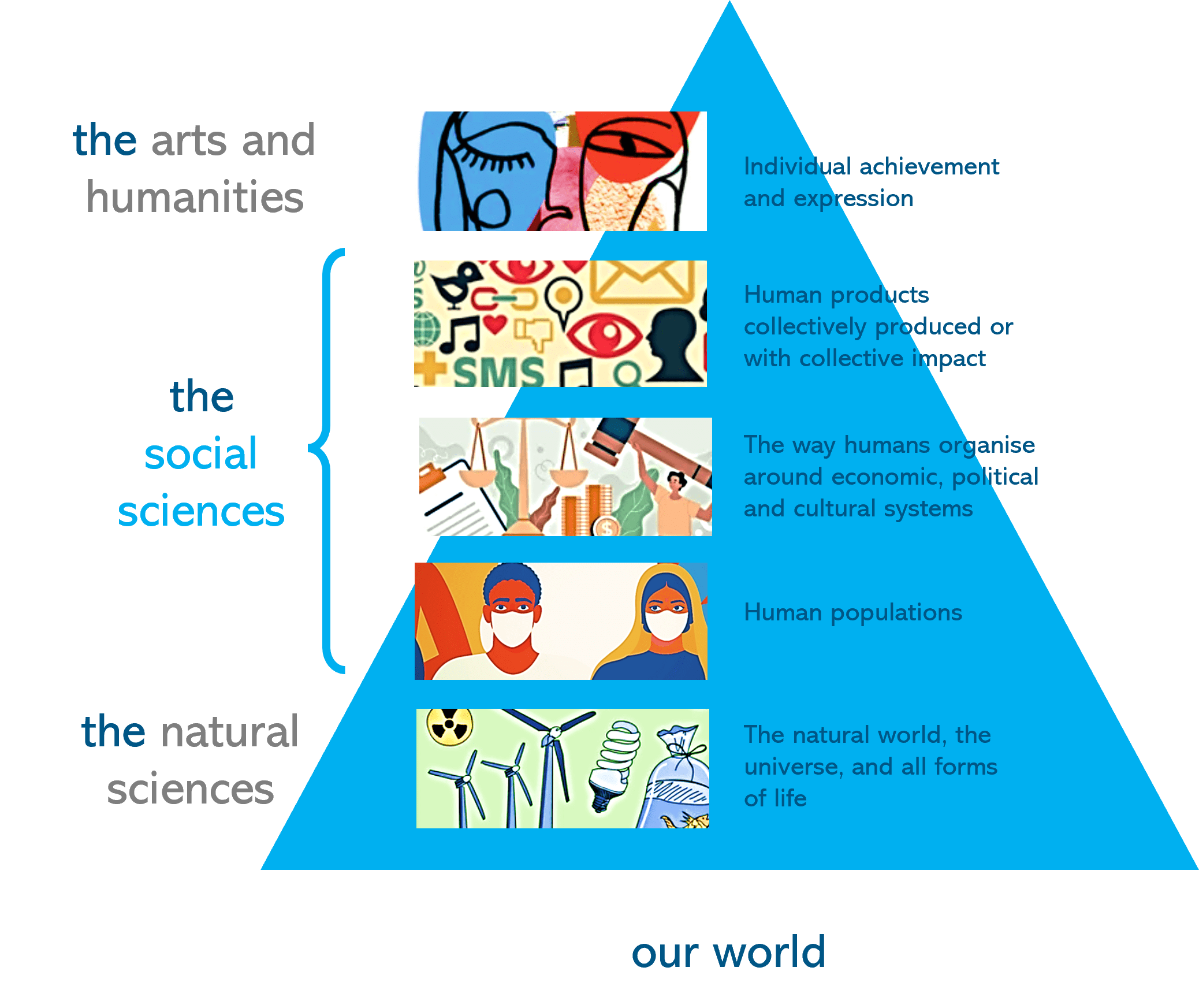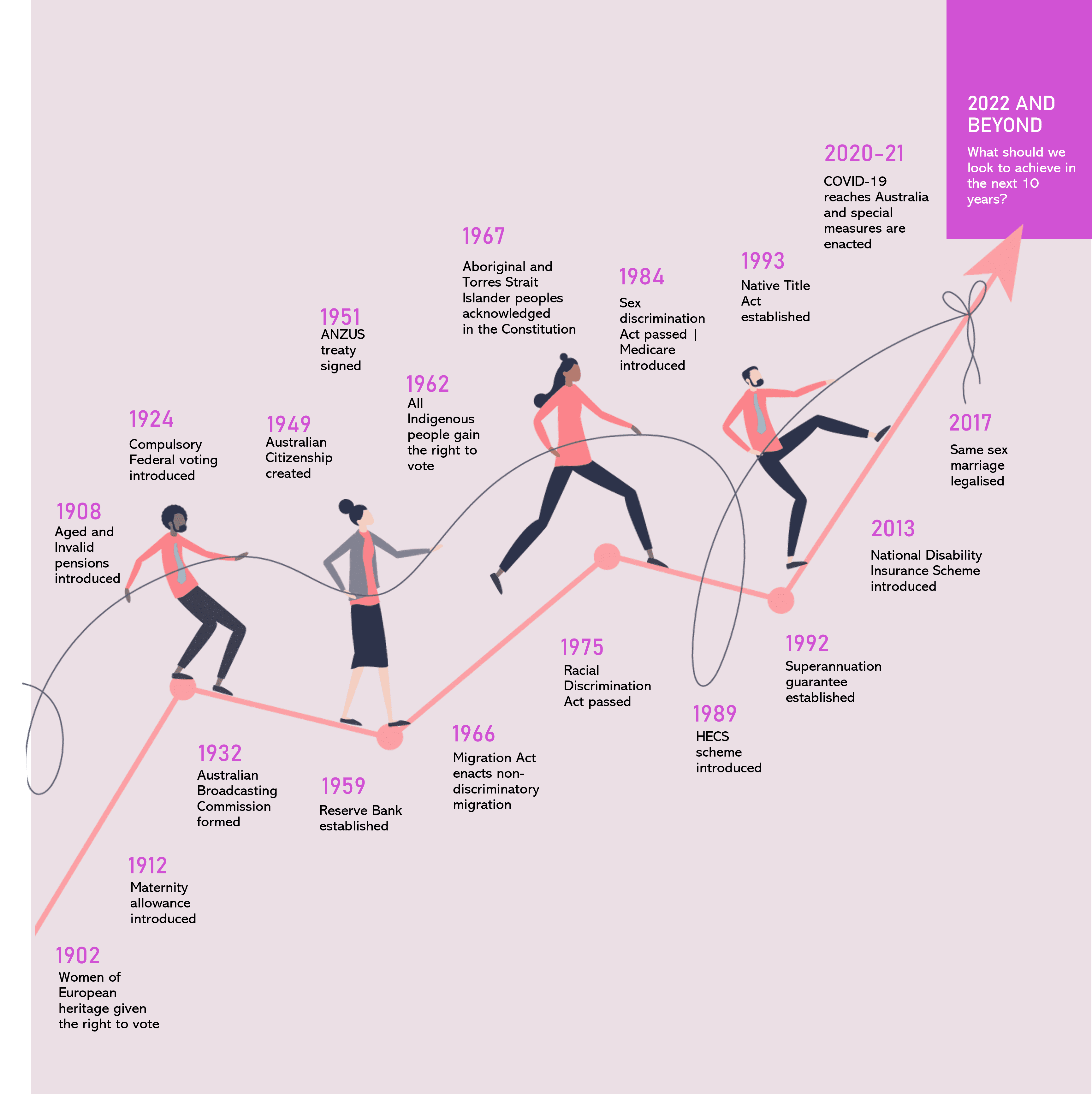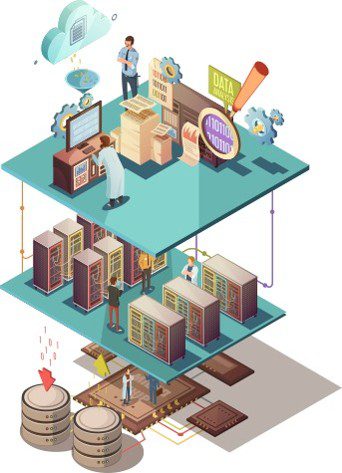About the Social Sciences
Social science is research on and knowledge about society: its institutions and structures, its histories and its people. There are a broad range of social science disciplines (figure below) that use systematic methods to understand, describe, educate, predict an influence the social world. Their defining feature is a focus on the social.
What is ‘social’?
Social in this context refers to events, objects, rules, patterns and other things that emerge spontaneously or by design when humans interact in groups.
Think friendship, families, religion, language, politics, schools and hospitals, legislation, markets, armed forces and elections. Or traffic rules, slavery, poverty, crime, corruption, cooperation, justice, homelessness, activism, social media, consumerism, and so on.
Social scientists define social systems as comprising biological, political, economic and cultural components. A social system can be as small as a family or a football team, and as big as a group of nations.
The social sciences and adjacent disciplines

Select social science disciplines
| Social sciences aim to understand and explain |
Social technologies aim to modify and improve |
|
| At the intersection between social sciences and humanities | Philosophy, History, Cultural Studies, Linguistics | Urban Planning, Design |
| Squarely ‘social’ | Economics, Sociology, Political Science, Criminology, Anthropology, Indigenous Studies | Public Policy, Education, International Development, Social Work |
| Business and professionally-oriented | Pedagogy, Management, Accounting, Law, Media & Communication Studies | Marketing, Management, Law, Journalism |
| At the intersection between social science, STEM and health and medical sciences | Public Health, Human Geography, Demography, Psychology, Statistics | Public Health, Psychology |
Why social science matters
Why social matters
Social matters a lot. Consider:
- Social systems shape our lives. Our education and health, our happiness and our grief, our families and freedoms, our beliefs and expressions. Who we love and how we die, how we can contribute and what gives our lives meaning. How our children are born and how they are raised. Almost everything we do and experience is inherently social.
- Social can make or break our world. The biggest challenges facing our world are fundamentally social: climate change or pandemics: our ability to adapt to and limit further change, to develop and adopt new science and technology, and to ensure a sustainable future for millions of species, including our own. Each of these are fundamentally social.
Why social science matters
Understanding social systems allows us to act deliberately to improve the lives of current and future generations. Social science training and approaches equip graduates, professionals, researchers and socially-minded Australians with the knowledge and understanding to:
- Protect and uphold democracy.
- Prevent or correct misuse of technology, and ensure equitable use and distribution of its benefits.
- Develop effective strategies to preserve the natural environment.
- Improve the fairness, effectiveness, efficiency, equity and accountability of public institutions, policies and programs.
- Identify and address inequality, discrimination, harassment and abuse.
- Continuously improve our education systems.
- Understand and deal with public health problems, including mental health.
- Improve our chances at individual and collective prosperity and happiness.
Why the ‘social’ matters: A century of social milestones in Australia

Sector overview
Australia’s social science sector is diverse and expansive. It connects with and impacts every person in different ways at different times of their lives, and is fundamental to the operation of our businesses, our governments and our economy.
 |
 |
 |
 |
|
|
SCHOOLS
|
VET & HIGHER EDUCATION | GOVERNMENT, BUSINESS & COMMUNITY | UNIVERSITIES & RESEARCH ORGANISATIONS | |
| WHO PARTICIPATES | Everyone | 44% of school leavers and mature-age students enrolled in social science units and programs at TAFE or other VET providers; and 53% of those enrolled in higher education. | Approx. 500,000 social science professionals (economists, accountants, lawyers psychologists, etc.) and ~3 million social science graduates working in jobs across the economy (top employment sectors: education, health, professional services and government). | Approx. 28,000 social scientists researchers in universities and many more employed in business (e.g. consulting) government departments and agencies (e.g. CSIRO) and community organisations. |
| WHY WE NEED IT |
|
|
Social science skills are required across the economy (skills and qualifications in management, HR, law, accounting etc). They are used in businesses, government departments and in a broad range of not-for-profit organisations. |
|
| WHAT DETERMINES QUALITY | Teacher training; curriculum design and content; government funding; parents’ perceptions about the value of social science education. | Student demand; employer demand; accessibility (e.g., tuition costs); government funding; teaching incentives. | Quality of training (graduate and professional development); pathways for research/industry engagement and knowledge transfer. | Research funding and infrastructure; researcher training; pathways for engagement; partnerships with government and industry. |
Grand challenges
The social sciences have a vital role to play in addressing the defining social challenges of our times. But they cannot do so alone. Effective research and solutions require expertise from across the disciplines (social sciences, STEM, health and medical, and the humanities), and from all parts of society. These seven interconnected issues have been identified through our consultations as a top-level challenge agenda for the social sciences.
1
Blank bit
Your content goes here. Edit or remove this text inline or in the module Content settings. You can also style every aspect of this content in the module Design settings and even apply custom CSS to this text in the module Advanced settings.
The Democratic Deficit
The steady erosion of democratic principles and processes impedes social scientific and democratic deliberation and coordinated action in the collective interest of our common humanity. How we overcome obstacles to act collectively when different actors’ short-term interests don’t align is a defining core issue that sits at the heart of our inability to solve many problems, large and small. Understanding how the “democratic deficit” comes about, and how to prevent or overcome its effects is one of the world’s most pressing challenges, and one that sits squarely in the province of the social sciences.
2
Blank bit
Your content goes here. Edit or remove this text inline or in the module Content settings. You can also style every aspect of this content in the module Design settings and even apply custom CSS to this text in the module Advanced settings.
Genuine Reconciliation
Australia’s First Nations have suffered 233 years of colonisation, oppression, discrimination and racism. The social sciences own part of this legacy. As such, they have a moral obligation to right wrongs and work actively for genuine reconciliation. This requires involvement and inclusion, direct action (entailing cost and effort) and critical research and scholarship aimed at progressing the reconciliation movement on a national scale.
3
Blank bit
Your content goes here. Edit or remove this text inline or in the module Content settings. You can also style every aspect of this content in the module Design settings and even apply custom CSS to this text in the module Advanced settings.
Post-COVID Recovery
In the decades following WWII, Australia benefited from unprecedented economic growth and improvements in wellbeing. These resulted directly from a raft of reconstruction policies and programs designed and guided in large part by the leading social scientists of the day. The post-COVID recovery presents the same opportunity: society has broken with its norm, our governments have demonstrated to themselves and to their constituents the viability and benefits of sweeping social and economic policies, and Australia has fared better than just about any country as a consequence. As was the case 70 years ago, social sciences once again have the opportunity to inform and guide the post-COVID reconstruction of a more resilient, equitable and prosperous society.
4
Blank bit
Your content goes here. Edit or remove this text inline or in the module Content settings. You can also style every aspect of this content in the module Design settings and even apply custom CSS to this text in the module Advanced settings.
Digital Transitions
The accelerating development, uptake and incorporation of digital, connected and autonomous technologies is accompanied by enormous social transformation. How we work, learn and engage with others, as well as the scope and nature of services and information collected by governments and businesses are all in flux to varying degrees. Social sciences are centrally placed to understand, advise and forecast these social changes through traditional knowledge and methods, and through the new techniques and technologies being enabled by linked data and digital technologies themselves. The converse–a failure to proactively engage with the digital transition–will see the capabilities and relevance of social science steadily fade.
5
Blank bit
Your content goes here. Edit or remove this text inline or in the module Content settings. You can also style every aspect of this content in the module Design settings and even apply custom CSS to this text in the module Advanced settings.
Climate & Sustainability
Science and technology have shown us the causes, consequences and risks of climate change, and they have a critical role in developing needed technologies to reduce emissions and manage harms in the future. The key challenges at present, however, are social: How di we overcome the failings of planetary governance and the domestic political impasse of capital and will? How do we mobilise grassroots social change? How do we cost-effectively incentivise change in business behaviours? And how do we best distribute the burdens associated with adaptation across varying communities? These are all questions that social scientists must answer.
3
Blank bit
Your content goes here. Edit or remove this text inline or in the module Content settings. You can also style every aspect of this content in the module Design settings and even apply custom CSS to this text in the module Advanced settings.
Social Inequality
Never before in Australia’s history have there been greater differences in opportunity, health, wealth and wellbeing between the millions of educated and prosperous Australians, and the almost one million experiencing long-term poverty and disadvantage. Social science has a pivotal role to play in understanding, addressing and guiding us towards a narrowing of a two-tier society; although, as a sector of educated professionals, the social sciences themselves have to overcome the bias of privilege to do so.
7
Blank bit
Your content goes here. Edit or remove this text inline or in the module Content settings. You can also style every aspect of this content in the module Design settings and even apply custom CSS to this text in the module Advanced settings.
The Future of Work
Technology-enabled change in services and consumption is likely to accelerate the existing changes in employment. Freelance and gig-based economies will become pervasive; scale and efficiencies in robotics, machine learning and Artificial Intelligence will transform many occupations and industries; and continued globalisation will transform others. Understanding, forecasting and helping to guide and prepare our society for the adaptations that will be required is a grand challenge for the social sciences, and one which will shape the future of the social sciences themselves.
